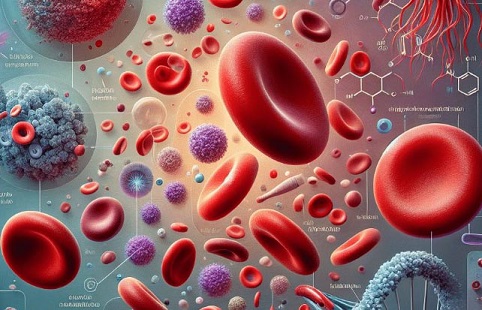Nikhil Prasad Fact checked by:Thailand Medical News Team Aug 07, 2024 1 year, 4 months, 2 weeks, 5 days, 3 hours, 44 minutes ago
COVID-19 News: Recent research has uncovered that COVID-19 triggers widespread changes in the blood glycoproteome, shedding light on the disease's complexity and potential avenues for better diagnosis and treatment. This
COVID-19 News report dives into the findings of a comprehensive study conducted by researchers from the Leiden University Medical Center (LUMC)-Netherlands and other collaborating institutions.
 Dutch study finds that COVID-19 causes systemic changes in blood glycoproteome
The Study and Its Methodology
Dutch study finds that COVID-19 causes systemic changes in blood glycoproteome
The Study and Its Methodology
The research team analyzed blood samples from 169 COVID-19 patients and 12 healthy controls, focusing on total plasma N-glycosylation (TPNG). Using advanced mass spectrometry techniques, they identified 85 distinct N-glycans and quantified changes in glycosylation patterns. The study aimed to identify specific glycosylation signatures associated with COVID-19 severity, providing insights into the systemic impact of the virus.
Key Findings: Unique Glycosylation Patterns in COVID-19 Patients
The study found significant differences in the glycosylation profiles of COVID-19 patients compared to healthy controls. Notably, 59 out of the 85 identified glycans showed different levels between the two groups. Severe COVID-19 cases were marked by elevated levels of tri- and tetra-antennary N-glycans, which are complex structures with multiple branching points.
One of the most striking discoveries was the increased a2,6-sialylation in severe COVID-19 cases. Sialylation refers to the addition of sialic acid to glycan structures, and this modification was particularly pronounced in patients with severe symptoms. Conversely, levels of di-antennary, core-fucosylated, and non-sialylated glycans were significantly lower in COVID-19 patients.
Implications for COVID-19 Diagnosis and Severity Prediction
The altered glycosylation patterns provide potential biomarkers for distinguishing COVID-19 patients from healthy individuals and predicting disease severity. For instance, specific glycans such as H7N6E2L1, H8N7E1L2, and H7N6E3L1 showed high classification accuracy in differentiating between patients and controls. These biomarkers could be used to develop non-invasive diagnostic tests, improving early detection and patient stratification.
Understanding the Systemic Impact of COVID-19
The changes in glycosylation patterns suggest that COVID-19 affects various biological pathways, particularly those involving acute-phase proteins, immunoglobulins, and the complement system. The increased sialylation of certain glycans is indicative of an enhanced inflammatory response, which is a hallmark of severe COVID-19.
Moreover, the study found a correlation between glycosylation changes and markers of liver damage, such as alanine aminotransferase (ALAT) and aspartate aminotransferase (ASAT). This suggests that the glycosylation alterations may partly reflect liver damage, which is prevalent in severe COVID-19 cases.
Future Directions and Research Needs
While the study provides valuable insights, further research is needed to fully understand the functional implications of these glycosylation changes. Future studies should aim to dissect glycosylation alterations in a protein- and site-specific manner to uncover specific functional leads. Additionally, larger studies with more control samples are necessary to validate these findings and develop reliable diagnostic tests.
The findings highlight the importance of glycomics in understanding the systemic effects of COVID-19. By identifying specific glycosylation signatures associated with disease severity, researchers can develop better diagnostic tools and potentially uncover new therapeutic targets.
Conclusion
The research conducted by the LUMC team and their collaborators has revealed significant systemic changes in the blood glycoproteome of COVID-19 patients. These findings underscore the complexity of the disease and provide a foundation for developing better diagnostic and therapeutic strategies.
The study findings were published in the peer-reviewed journal:
iScience.
https://www.cell.com/iscience/fulltext/S2589-0042(24)01599-2
For the latest
COVID-19 News, keep on logging to Thailand Medical News.
Read Also:
https://www.thailandmedical.news/news/breaking-even-mild-covid-19-can-cause-microvasculature-changes-of-the-optic-nerve
https://www.thailandmedical.news/news/one-third-of-all-exposed-to-covid-19-likely-to-develop-cerebral-microbleeds
